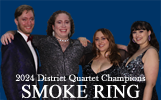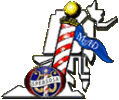One night in December of 1962, after an Abington, PA, Chapter rehearsal, a bass, tenor, and two leads were singing tags. The bass, Joe Schmid, and the tenor, Phil Steel, had been singing together in a quartet for three years, with Joe singing baritone. Upon forming the Abington Chapter in 1961, Joe decided to switch to the bass part - so with Phil, they decided to search for the perfect lead and baritone.
Singing with two new barbershoppers, Phil and Joe looked at each other and smiled. There were big overtones ringing overhead. But both of the new men were singing lead in the chorus. Bill Clipman, an attorney-at-law, had attended the Abington Chapter Charter Night Show and filled out a prospective member card. Young Les Moyer, just out of high school, had known about barbershopping as his sister was married to a Cherry Hill barbershopper, Phil Noll.
The next day Joe and Phil spoke on the phone as they were prone to do for more than 30 years on a daily basis. It was agreed that the sound was there, blend of voices, etc., but would Les want to convert to baritone full time? Les, not knowing what he was getting into, happily agreed, and the rest is history. All agree that whatever quartet he sings with, sounds good thanks to his voice and expertise. Bill was never one to refuse to sing, and so quickly agreed to form the Continental Four with the other three. A few weeks after forming, the Jenkintown Music Theater announced their spring show, "The Music Man." The C4 auditioned, got the part, and spent the next several months "singing up street and down alley." They were eventually to appear in the same show three more times over the ensuing twenty years. This included two weeks in the professional Lambertville Music Circus tent, with rehearsals and eight performances.
After only three months, they entered the International preliminaries in Harrisburg. With only two competition songs in their repertoire, they shocked everyone and mainly themselves by making the finals. They then qualified for the Mid-Atlantic competition by qualifying in the Division contest. In the fall of 1963, they leaped into a second place finish. They were to duplicate this same finish for two more years, never giving up in their quest for the championship. Then, lead Bill Clipman took a job 100 miles away in Harrisburg, and bari Les Moyer decided to start his college education. This left Joe and Phil to search for replacements. That previous summer they had met a 17-year old recent high school grad from Ohio, who told them he would be entering college at Swarthmore, near Philadelphia. He said, "Call me up if you ever need a singer." In January of 1966, call him they did, and asked if he wanted to sing in a quartet. He said he would love to, but he was really a bass. He asked for three weeks to "develop his lead register," and he would let them know.
He called back with a positive reply and said he knew of a possible baritone at the Curtis Institute of Music in Philly. Their rehearsal was a disaster with no chords locking. The next day Kirk called and said he knew of another baritone at Curtis. The next week he showed up with a guy named Roger Blackburn, and the chords rang immediately. Now with only five weeks before the International Prelims, they learned four songs, drove down to Richmond, VA, and promptly qualified for the Chicago International. The two college students went back to school, advising they couldn't sing again until early June. During that time, Kirk arranged four numbers, they rehearsed every night in June, and finished 34th in Chicago. They next went to Atlantic City in October and won the Mid-Atlantic District Championship (see photo). That same weekend was the college tennis tournament in New Brunswick, NJ. Kirk, the number one player on Swarthmore's team, was entered. So, in between the competitions Friday and Saturday, Joe and Phil shuttled him back and forth several times. (By the way, Kirk also won that competition.)
School and other matters made the two college singers have to drop out of the quartet. With dozens of jobs on the schedule, fortunately Bill and Les agreed to return and sing the shows. Kirk and Roger eventually went to direct several choruses, including on the International stage. Roger recorded himself playing all four parts on trumpet in his "Barbershopping in Brass" record. He also organized the Philharmonic Flavor with three other members of the renown Philadelphia Orchestra, appearing at the International in Pittsburgh live. All six members of the C4 went on to sing in other quartets and still enjoy singing together even today when they meet. It's definitely a lifelong hobby.
|





